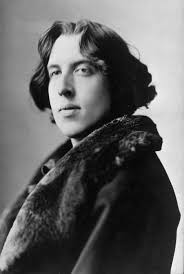The Picture of Dorian Gray Page #49
The Picture of Dorian Gray is a Gothic and philosophical novel by Oscar Wilde, first published complete in the July 1890 issue of Lippincott's Monthly Magazine. Fearing the story was indecent, prior to publication the magazine's editor deleted roughly five hundred words without Wilde's knowledge.
As the hall door shut, Campbell started nervously, and having got up from the chair, went over to the chimney-piece. He was shivering with a kind of ague. For nearly twenty minutes, neither of the men spoke. A fly buzzed noisily about the room, and the ticking of the clock was like the beat of a hammer. As the chime struck one, Campbell turned round, and looking at Dorian Gray, saw that his eyes were filled with tears. There was something in the purity and refinement of that sad face that seemed to enrage him. "You are infamous, absolutely infamous!" he muttered. "Hush, Alan. You have saved my life," said Dorian. "Your life? Good heavens! what a life that is! You have gone from corruption to corruption, and now you have culminated in crime. In doing what I am going to do--what you force me to do--it is not of your life that I am thinking." "Ah, Alan," murmured Dorian with a sigh, "I wish you had a thousandth part of the pity for me that I have for you." He turned away as he spoke and stood looking out at the garden. Campbell made no answer. After about ten minutes a knock came to the door, and the servant entered, carrying a large mahogany chest of chemicals, with a long coil of steel and platinum wire and two rather curiously shaped iron clamps. "Shall I leave the things here, sir?" he asked Campbell. "Yes," said Dorian. "And I am afraid, Francis, that I have another errand for you. What is the name of the man at Richmond who supplies Selby with orchids?" "Harden, sir." "Yes--Harden. You must go down to Richmond at once, see Harden personally, and tell him to send twice as many orchids as I ordered, and to have as few white ones as possible. In fact, I don't want any white ones. It is a lovely day, Francis, and Richmond is a very pretty place--otherwise I wouldn't bother you about it." "No trouble, sir. At what time shall I be back?" Dorian looked at Campbell. "How long will your experiment take, Alan?" he said in a calm indifferent voice. The presence of a third person in the room seemed to give him extraordinary courage. Campbell frowned and bit his lip. "It will take about five hours," he answered. "It will be time enough, then, if you are back at half-past seven, Francis. Or stay: just leave my things out for dressing. You can have the evening to yourself. I am not dining at home, so I shall not want you." "Thank you, sir," said the man, leaving the room. "Now, Alan, there is not a moment to be lost. How heavy this chest is! I'll take it for you. You bring the other things." He spoke rapidly and in an authoritative manner. Campbell felt dominated by him. They left the room together. When they reached the top landing, Dorian took out the key and turned it in the lock. Then he stopped, and a troubled look came into his eyes. He shuddered. "I don't think I can go in, Alan," he murmured. "It is nothing to me. I don't require you," said Campbell coldly. Dorian half opened the door. As he did so, he saw the face of his portrait leering in the sunlight. On the floor in front of it the torn curtain was lying. He remembered that the night before he had forgotten, for the first time in his life, to hide the fatal canvas, and was about to rush forward, when he drew back with a shudder. What was that loathsome red dew that gleamed, wet and glistening, on one of the hands, as though the canvas had sweated blood? How horrible it was!--more horrible, it seemed to him for the moment, than the silent thing that he knew was stretched across the table, the thing whose grotesque misshapen shadow on the spotted carpet showed him that it had not stirred, but was still there, as he had left it. He heaved a deep breath, opened the door a little wider, and with half-closed eyes and averted head, walked quickly in, determined that he would not look even once upon the dead man. Then, stooping down and taking up the gold-and-purple hanging, he flung it right over the picture. There he stopped, feeling afraid to turn round, and his eyes fixed themselves on the intricacies of the pattern before him. He heard Campbell bringing in the heavy chest, and the irons, and the other things that he had required for his dreadful work. He began to wonder if he and Basil Hallward had ever met, and, if so, what they had thought of each other. "Leave me now," said a stern voice behind him. He turned and hurried out, just conscious that the dead man had been thrust back into the chair and that Campbell was gazing into a glistening yellow face. As he was going downstairs, he heard the key being turned in the lock. It was long after seven when Campbell came back into the library. He was pale, but absolutely calm. "I have done what you asked me to do," he muttered. "And now, good-bye. Let us never see each other again." "You have saved me from ruin, Alan. I cannot forget that," said Dorian simply. As soon as Campbell had left, he went upstairs. There was a horrible smell of nitric acid in the room. But the thing that had been sitting at the table was gone. CHAPTER 15 That evening, at eight-thirty, exquisitely dressed and wearing a large button-hole of Parma violets, Dorian Gray was ushered into Lady Narborough's drawing-room by bowing servants. His forehead was throbbing with maddened nerves, and he felt wildly excited, but his manner as he bent over his hostess's hand was as easy and graceful as ever. Perhaps one never seems so much at one's ease as when one has to play a part. Certainly no one looking at Dorian Gray that night could have believed that he had passed through a tragedy as horrible as any tragedy of our age. Those finely shaped fingers could never have clutched a knife for sin, nor those smiling lips have cried out on God and goodness. He himself could not help wondering at the calm of his demeanour, and for a moment felt keenly the terrible pleasure of a double life. It was a small party, got up rather in a hurry by Lady Narborough, who was a very clever woman with what Lord Henry used to describe as the remains of really remarkable ugliness. She had proved an excellent wife to one of our most tedious ambassadors, and having buried her husband properly in a marble mausoleum, which she had herself designed, and married off her daughters to some rich, rather elderly men, she devoted herself now to the pleasures of French fiction, French cookery, and French esprit when she could get it. Dorian was one of her especial favourites, and she always told him that she was extremely glad she had not met him in early life. "I know, my dear, I should have fallen madly in love with you," she used to say, "and thrown my bonnet right over the mills for your sake. It is most fortunate that you were not thought of at the time. As it was, our bonnets were so unbecoming, and the mills were so occupied in trying to raise the wind, that I never had even a flirtation with anybody. However, that was all Narborough's fault. He was dreadfully short-sighted, and there is no pleasure in taking in a husband who never sees anything."
Translation
Translate and read this book in other languages:
Select another language:
- - Select -
- 简体中文 (Chinese - Simplified)
- 繁體中文 (Chinese - Traditional)
- Español (Spanish)
- Esperanto (Esperanto)
- 日本語 (Japanese)
- Português (Portuguese)
- Deutsch (German)
- العربية (Arabic)
- Français (French)
- Русский (Russian)
- ಕನ್ನಡ (Kannada)
- 한국어 (Korean)
- עברית (Hebrew)
- Gaeilge (Irish)
- Українська (Ukrainian)
- اردو (Urdu)
- Magyar (Hungarian)
- मानक हिन्दी (Hindi)
- Indonesia (Indonesian)
- Italiano (Italian)
- தமிழ் (Tamil)
- Türkçe (Turkish)
- తెలుగు (Telugu)
- ภาษาไทย (Thai)
- Tiếng Việt (Vietnamese)
- Čeština (Czech)
- Polski (Polish)
- Bahasa Indonesia (Indonesian)
- Românește (Romanian)
- Nederlands (Dutch)
- Ελληνικά (Greek)
- Latinum (Latin)
- Svenska (Swedish)
- Dansk (Danish)
- Suomi (Finnish)
- فارسی (Persian)
- ייִדיש (Yiddish)
- հայերեն (Armenian)
- Norsk (Norwegian)
- English (English)
Citation
Use the citation below to add this book to your bibliography:
Style:MLAChicagoAPA
"The Picture of Dorian Gray Books." Literature.com. STANDS4 LLC, 2024. Web. 28 Nov. 2024. <https://www.literature.com/book/the_picture_of_dorian_gray_869>.




Discuss this The Picture of Dorian Gray book with the community:
Report Comment
We're doing our best to make sure our content is useful, accurate and safe.
If by any chance you spot an inappropriate comment while navigating through our website please use this form to let us know, and we'll take care of it shortly.
Attachment
You need to be logged in to favorite.
Log In